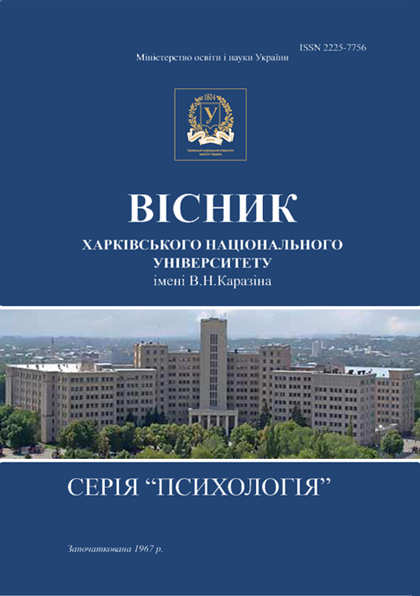Дослідження феномену прощення: психологічні підходи та емпіричні дані
Анотація
У статті представлені результати теоретичного та експериментального дослідження образи та прощення. Встановлено, що прощення може проявити себе як акт благородства та милосердя людини, яка відчуває себе ображеною. З’ясовано, що стратегія поведінки образливої особистості виступає особливим типом соціальної активності, коли індивід вважає себе ображеним та своєрідно реагує на образу, переживає її, спілкується з кривдником або не хоче розмовляти з ним, очікує прохання про вибачення, визнає можливість прощення та примирення з ним. Встановлено, що прощення залежить від віку, статі та професійних характеристик скривджених, від вибору стратегії поведінки в конфронтації з тим, хто їх образив. З’ясовано, що жінки та чоловіки мають відмінності у сприйнятті образи та готовності до її прощення, вікові особливості впливають на амплітуду та інтенсивність прояву образ, а сфера професійної діяльності накладає свій відбиток на ставлення людини до прощення та його можливі інсталяції.
Завантаження
Посилання
Hassyn E. A. Psykholohyia proshchenyia // Voprosy psykholohyy. 1999. № 4. S. 93-103.
Harkavets S. A., Yakovenko S. Y. Hendernye osobennosty ynstalliatsyy obydy // Visnyk Kharkivskoho natsionalnoho universytetu imeni V. N. Karazina. Seriia «Psykholohiia». 2016. Vyp. 59. S. 59-64.
Harkavets S. O., Yakovenko S. I. Metodyky doslidzhennia obrazy: naukovo-metodychnyi posibnyk z «Psykhodiahnostyky». Sievierodonetsk: Vyd-vo «Petit», 2017. 68 s.
Harkavets S. A., Yakovenko S. Y. Osobennosty voznyknovenyia y proiavlenyia obydy na raznykh etapakh ontoheneza lychnosty // Teoretychni i prykladni problemy psykholohii: zb. nauk. prats Skhidnoukrainskoho natsionalnoho universytetu imeni Volodymyra Dalia. Sievierodonetsk : Vyd-vo SNU im. V. Dalia, 2015. T. 2, № 3 (38). S. 105-116.
Yzard K. Psykholohyia эmotsyi. SPb.: Pyter, 2008. 464 s.
Ylyn E. P. Psykholohyia sovesty: vyna, styd, raskaianye. SPb.: Pyter, 2016. 288 s.
Chukova A. S. Sotsyalno-psykholohycheskye kharakterystyky proshchenyia kak fenomena mezhlychnostnoho obshchenyia : avtoref. dys. na soyskanye nauch. stupeny kand. psykhol. nauk : spets. 19.00.05 «Sotsyalnaia psykholohyia». Saratov, 2011. 22 s.
Porshnev B. F. O nachale chelovecheskoi ystoryy (Problemy paleopsykholohyy). M.: Mysl, 1974. 487 s.
Ukhtomskyi A. Domynanta dushy. Yz humanytarnoho nasledyia. Rybynsk: Rybynskoe podvore, 2000. 608 s.
Florenskaia T.A. Dyaloh v praktycheskoi psykholohyy: nauka o dushe. M.: VLADOS, 2001. 208 s.
Enrait R. Dukhovnoe razvytye proshchenyia. M.: Yzd-vo Akademyia, 1991. 220 s.
Allemand M. at al. The role of trait forgiveness and relationship satisfaction in episodic forgiveness // Journal of Social and Clinical Psychology. 2007. Vol. 26. № 2. P. 199-217.
Brown H. The conditions of forgiveness in recent philosophical thought // A Journey through Forgiveness / Ed. by M. R. Maamri, N. Verbin, E. L. Worthington. Jr. Oxford : Inter-Disciplinary Press, 2010. P. 11-17.
Close H. T. Forgiveness and responsibility: A case study. Pastoral Psychology. 1970. № 21. P. 19-25.
Crespi B. J. Oxytocin, testosterone, and human social cognition // Biological Reviews. Cambridge Philosophical Society. 2016. Vol. 91., Issue 2. P. 390-408.
Enright R. D. Clearing Up Client Confusion Regarding the Meaning of Forgiveness: An Aristotelian // Thomistic Analysis With Counseling Implications 2014. Vol. 59. P. 249-256.
Enright R. D. Counseling Within the Forgiveness Triad: On Forgiving, Receiving Forgiveness, and Self- Forgiveness // Jr. Counseling and Values. 1996. Vol. 40, Issue 2. P. 107-126.
Enright R. D. Forgiveness Is a Choice: A Step-By-Step Process for Resolving Anger and Restoring Hope. Washington, D. C. : APA Books, 2001. 299 p.
Fincham F., Hall J., Beach S. Forgiveness in marriage: current status and future directions // Family Relations. 2006. № 55. P. 415-427.
North J. Wrongdoing and forgiveness. Philosophy. 1987. Vol. 62. P. 499-508.
Verbin N. What is forgiveness? // A Journey through Forgiveness / Ed. by M. R. Maamri, N. Verbin, E. L. Worthington, Jr. Oxford: Inter-Disciplinary Press, 2010. P. 3-10.




